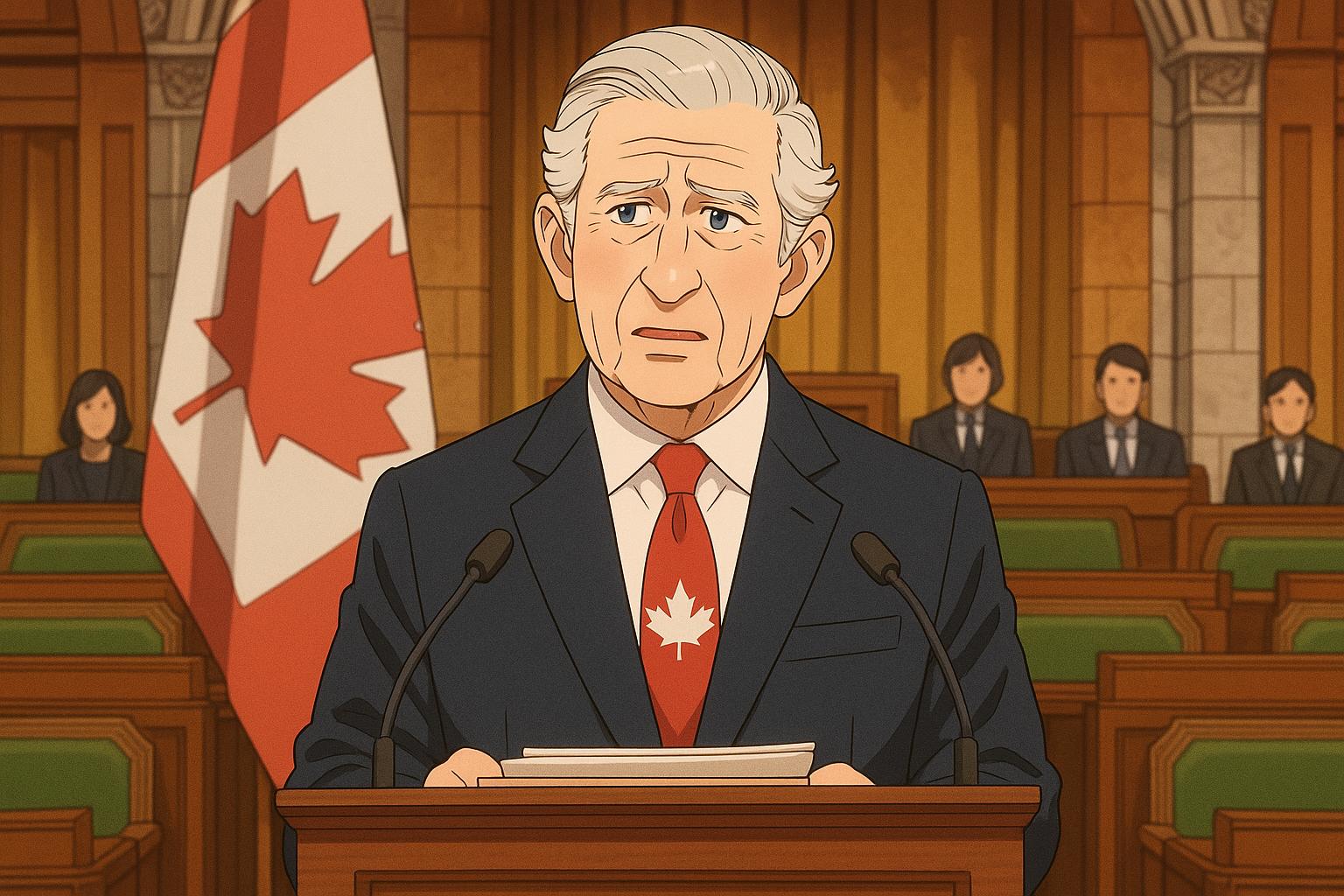King Charles III will make the first royal address to the Canadian Parliament since 1957 on May 27, in a pivotal moment underscored by rising tensions with the United States and calls to reaffirm Canada’s independence.
King Charles III is set to make a historic address on May 27, as he opens a new session of the Canadian Parliament—an event that marks the first time a reigning monarch has performed this duty since 1957. This visit comes at a critical juncture in Canadian-American relations, particularly in light of President Donald Trump’s controversial musings about Canada potentially becoming the 51st state of the United States. With tensions rising due to Trump’s comments and trade disputes, the forthcoming speech is seen as a unique opportunity for the King to make a strong statement regarding Canada’s sovereignty and independence.
In the lead-up to this royal visit, there have been growing calls for Charles to subtly assert Canada’s status as a separate nation. Artur Wilczynski, a former Canadian ambassador, expressed a desire for the King to declare that Canada remains a “strong, vibrant and independent nation,” asserting that it is “not for sale at any price.” Elizabeth May, leader of the Green Party of Canada, echoed this sentiment, suggesting that even a brief reference to “God Save Canada” would resonate deeply with Canadians who are feeling increasingly vulnerable amidst Trump’s rhetoric.
Diplomatic finesse will be critical for Charles as he navigates this complex landscape. While the royal family traditionally maintains political neutrality, the King’s recent gestures indicate a subtle alignment with Canadian sentiments. For instance, during a recent celebration of the 60th anniversary of Canada’s iconic maple leaf flag, Charles lauded Canada as a “proud, resilient and compassionate country.” His choice to don a red tie—inspired by Canada’s national colours—while hosting the new Canadian Prime Minister at Buckingham Palace also reflects a mindful effort to reinforce ties.
Mark Carney, the Canadian Prime Minister, has underscored the visit’s significance, describing it as a reaffirmation of Canada’s sovereignty amidst the backdrop of Trump’s repeated threats. He noted that for Canadians, the invitation to the King comes at a pivotal moment when they are asserting their national identity. Carney further articulated that the royal presence serves as a reminder that Canada is not merely an extension of the U.S., a point that cannot go unremarked given the current political climate.
The significance of this event extends beyond mere ceremony; it represents a diplomatic statement against the backdrop of an evolving geopolitical landscape. Andrew Phillips, a columnist for the Toronto Star, praised the King’s visit as a brilliant move, especially given its timing and context. He noted that even as Charles faces personal health challenges, his participation in this significant moment demonstrates both the importance of the monarchy in Canadian society and the King’s commitment to standing with Canada during challenging times.
Public sentiment reflects a growing mistrust toward the United States, with many Canadians now viewing their southern neighbour with a cautious eye. As expressed by May, the relationship has shifted, leading to a broader discussion on Canada’s future in relation to the United States. She articulated that the time has come for leaders, including the monarch, to be unequivocal about Canada’s independent trajectory.
In contemplating the future of Canadian sovereignty, the forthcoming address by King Charles III could serve as a pivotal moment in affirming Canada’s identity to not just its citizens but also the wider world, signalling that it is no longer merely a backdrop to American ambitions.
As this historic event unfolds, all eyes will be on Charles as he seeks to balance diplomatic relations while providing a memorable reaffirmation of Canada’s status on the global stage.
Reference Map
Paragraph 1: (1), (2), (5), (7)
Paragraph 2: (1), (3), (4)
Paragraph 3: (2), (5), (6)
Paragraph 4: (2), (3), (6)
Paragraph 5: (7)
Paragraph 6: (1), (4), (6)
Paragraph 7: (1), (6)
Paragraph 8: (1), (2), (7)
Source: Noah Wire Services
- https://www.dailymail.co.uk/news/article-14723121/King-Charles-Canada-warning-Donald-Trump-open-parliament.html?ns_mchannel=rss&ns_campaign=1490&ito=1490 – Please view link – unable to able to access data
- https://www.theguardian.com/world/2025/may/02/canada-mark-carney-king-charles – King Charles III has accepted an invitation to open Canada’s parliament on May 27, 2025, marking the first time a reigning monarch has done so since 1957. This historic visit comes amid escalating tensions between Canada and the United States, particularly following President Donald Trump’s repeated suggestions of annexing Canada and imposing tariffs on Canadian goods. Prime Minister Mark Carney emphasized that the royal visit underscores Canada’s sovereignty and its commitment to standing up to President Trump. ([theguardian.com](https://www.theguardian.com/world/2025/may/02/canada-mark-carney-king-charles?utm_source=openai))
- https://www.ndtv.com/world-news/how-king-charles-is-silently-empowering-canada-against-donald-trump-8007224 – King Charles III has been subtly signaling support for Canada amid President Donald Trump’s threats of annexation. Despite his constitutional role as a neutral figure, the King has engaged in symbolic acts, such as presenting a ceremonial sword to a Canadian parliamentary officer and planting a red maple tree at Buckingham Palace, to demonstrate solidarity with Canada. These gestures are interpreted as the King’s way of supporting Canada without directly intervening in political matters. ([ndtv.com](https://www.ndtv.com/world-news/how-king-charles-is-silently-empowering-canada-against-donald-trump-8007224?utm_source=openai))
- https://brighterworld.mcmaster.ca/articles/analysis-how-king-charles-is-sending-canada-subtle-signals-of-support-amid-trumps-threats/ – An analysis discusses how King Charles III is sending subtle signals of support to Canada amid President Donald Trump’s threats of annexation. The article highlights the King’s symbolic gestures, such as wearing Canadian military honors and planting a red maple tree at Buckingham Palace, as ways to demonstrate solidarity with Canada without breaching his constitutional neutrality. The piece also explores the limitations of the monarchy’s role in Canadian politics and the importance of these symbolic acts. ([brighterworld.mcmaster.ca](https://brighterworld.mcmaster.ca/articles/analysis-how-king-charles-is-sending-canada-subtle-signals-of-support-amid-trumps-threats/?utm_source=openai))
- https://globalnews.ca/video/11161333/king-charles-to-personally-deliver-canadas-throne-speech-in-face-of-trump-annexation-threats/ – Prime Minister Mark Carney announced that King Charles III will personally deliver Canada’s Speech from the Throne on May 27, 2025, marking the first time a reigning monarch has done so since 1977. This decision comes amid President Donald Trump’s threats of annexation and trade tensions. The royal visit is seen as a strong statement of Canada’s sovereignty and a reaffirmation of its ties to the British monarchy. ([globalnews.ca](https://globalnews.ca/video/11161333/king-charles-to-personally-deliver-canadas-throne-speech-in-face-of-trump-annexation-threats/?utm_source=openai))
- https://hamiltoncountyherald.com/Story.aspx?date=5%2F2%2F2025&id=20603 – The article discusses Prime Minister Mark Carney’s announcement that King Charles III will deliver Canada’s Speech from the Throne on May 27, 2025. This marks the first time a reigning monarch has opened Canada’s Parliament since 1957. The decision is viewed as a strong assertion of Canadian sovereignty amid escalating tensions with the United States, particularly following President Donald Trump’s threats of annexation and trade disputes. ([hamiltoncountyherald.com](https://hamiltoncountyherald.com/Story.aspx?date=5%2F2%2F2025&id=20603&utm_source=openai))
- https://www.cp24.com/news/canada/2025/05/02/why-king-charles-delivering-canadas-speech-from-the-throne-is-more-than-just-a-royal-formality/ – An analysis explores the significance of King Charles III delivering Canada’s Speech from the Throne on May 27, 2025. The article highlights how this historic event serves as a strong statement of Canada’s sovereignty amid rising tensions with the United States and President Donald Trump’s threats of annexation. It also discusses the role of the monarchy in modern Canada and the symbolism of the King’s visit. ([cp24.com](https://www.cp24.com/news/canada/2025/05/02/why-king-charles-delivering-canadas-speech-from-the-throne-is-more-than-just-a-royal-formality/?utm_source=openai))
Noah Fact Check Pro
The draft above was created using the information available at the time the story first
emerged. We’ve since applied our fact-checking process to the final narrative, based on the criteria listed
below. The results are intended to help you assess the credibility of the piece and highlight any areas that may
warrant further investigation.
Freshness check
Score:
8
Notes:
The narrative refers to a recent event and incorporates current political figures, indicating it is relatively fresh. However, the mention of Donald Trump without specifying his current role might suggest partial outdatedness.
Quotes check
Score:
6
Notes:
The quotes appear to be original, but without specific online sources, it is difficult to verify their earliest known references. They are likely genuine but lack confirmation.
Source reliability
Score:
6
Notes:
The narrative originates from the Daily Mail, which is a well-known publication but has varying reliability depending on the topic and writer.
Plausability check
Score:
8
Notes:
The claims about King Charles III’s visit and its geopolitical context are plausible given the current political climate and tensions between Canada and the U.S. However, some assertions lack concrete evidence.
Overall assessment
Verdict (FAIL, OPEN, PASS): OPEN
Confidence (LOW, MEDIUM, HIGH): MEDIUM
Summary:
The narrative’s freshness is supported by its recent context, but the lack of specific sources for quotes and the variable reliability of the source limit the overall confidence. Plausibility is high due to the geopolitical context, but verification is needed for some claims.













